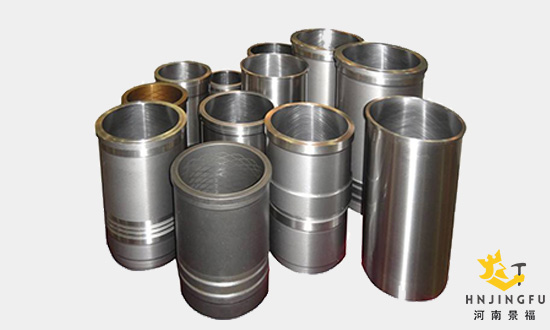
Dismantling of cylinder liner
1. Before disassembly, use a steel code to mark the cylinder number on the cylinder sleeve, which can be marked in front of the body to indicate the installation direction and position.
2. Measure the height of the upper end face of the cylinder liner above the upper surface of the cylinder block.
3. Use a cylinder puller to remove the cylinder liner. Select a circular tray and install the cylinder puller assembly onto the cylinder sleeve that needs to be removed. Be careful not to press the lower circular tray against the cylinder body to avoid damaging it. Then proceed to remove the cylinder sleeve from the body.
Installation of cylinder liner
1. Clean the scale inside the water jacket, remove the scale and debris from the water blocking ring groove on the lower surface of the cylinder sleeve shoulder and the upper surface of the cylinder sleeve installation hole in the body.
2. Trial installation of cylinder liner: Without installing a water blocking ring, insert the cylinder into the installation hole of the cylinder liner in the body, and it should be able to rotate the cylinder liner without excessive shaking. The height of the cylinder liner protruding from the upper plane of the body should be between 0.08 and 0.21mm (usually measured with a depth caliper or a flat ruler and a feeler gauge). If the protrusion height is not enough, a thin copper sheet can be added under the shoulder of the cylinder liner to adjust. The height difference between cylinder liners on the same body should not exceed 0.03mm.
3. Installation of water blocking ring: Check whether the water blocking ring is a qualified product (characterized by uniform thickness, no cracks, and a smooth surface). Install the water blocking ring into the groove smoothly, without twisting or damage, and should protrude evenly along the entire circumference of the ring groove.
4. Install cylinder liner: Coat the surface of the water blocking ring with soapy water, and press the cylinder liner into the installation holes according to the trial installation positions. Check if the water blocking ring is squeezed out or cut out. If it is squeezed out or cut out, replace the water blocking ring and reinstall it. Check if the cylinder liner is deformed, if the cone ovality exceeds 0.03mm. The cylinder liner should be removed, the cause identified, the fault eliminated, and reinstalled.
5. Check the protrusion height and height difference of each cylinder liner.
Inspection of cylinder liner after installation
The repaired cylinder should undergo quality inspection and the results should be filled in the cylinder liner identification card. The technical requirements for the repaired cylinder liner are as follows:
1. The working surface of the cylinder liner has no black skin (un bored areas), no knife marks, and the smoothness is not lower than the technical specifications.
2. The diameter of the cylinder liner should be within the tolerance range of the repair dimension, and its roundness and cylindricity should be within the standard range. The roundness of the lower part of the cylinder liner (50-80mm) is allowed to be within the range of 0.005mm.
3. The center deviation of the cylinder liner shall not exceed 0.05mm within a length of 100mm.
After the cylinder is assembled, a water pressure test should be conducted. There is no water leakage at the water blocking ring under a pressure of 0.3-0.5MPa.
Authorized wholesaler,100% Genuine Parts ;
Foucsed on commercial vehicle parts more than 10 years;
Get reply within 24h;
Door to door delivery and OEM service is avaliable.
Contact and Get Price Now!